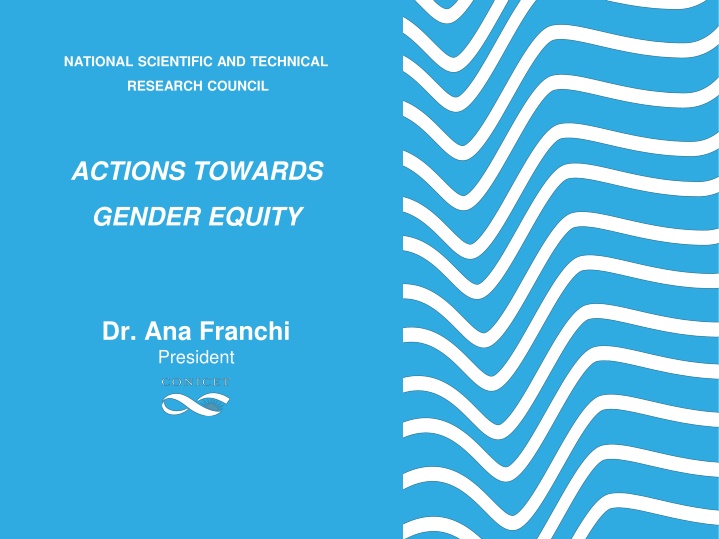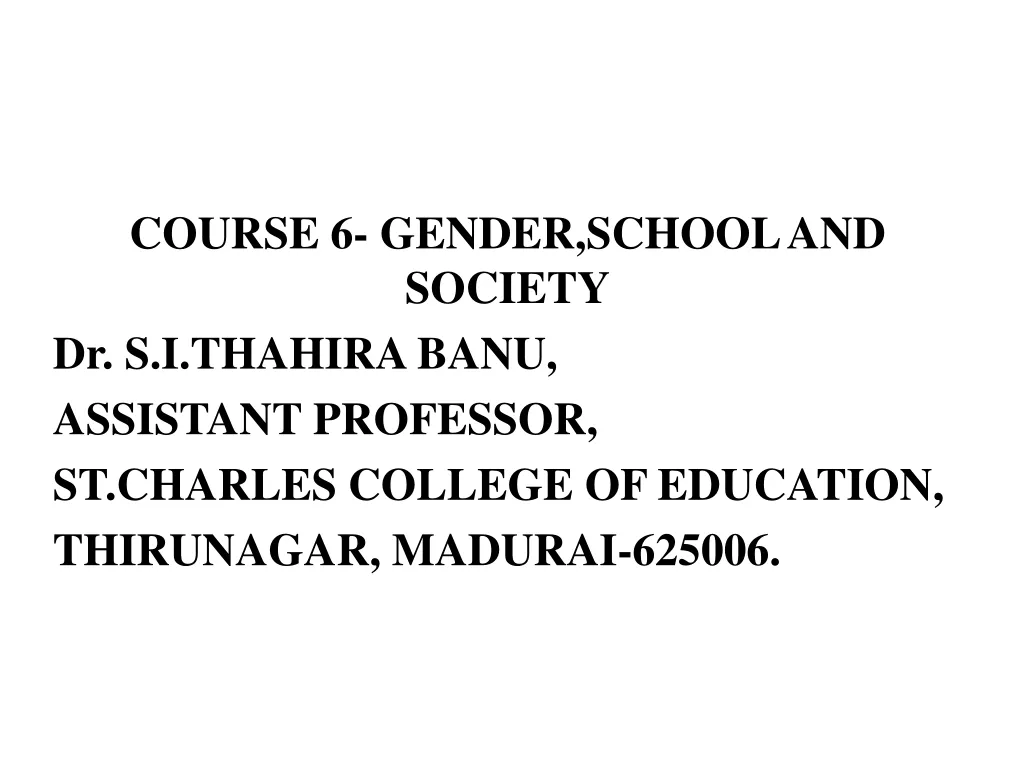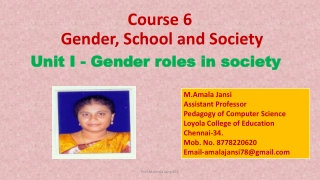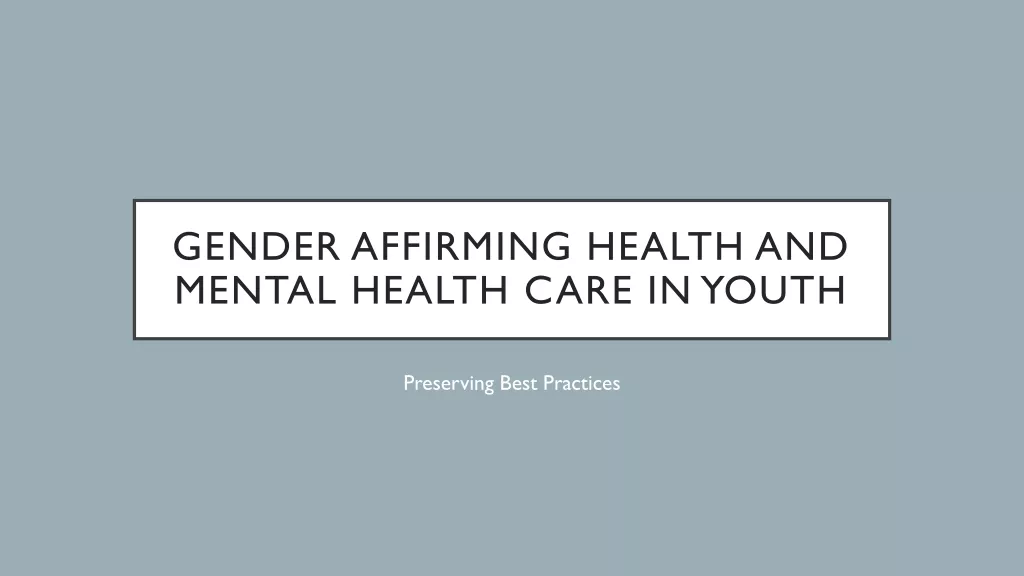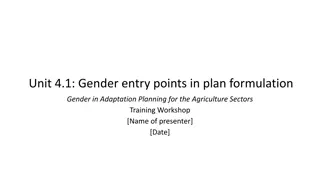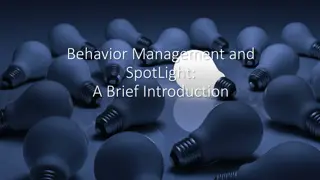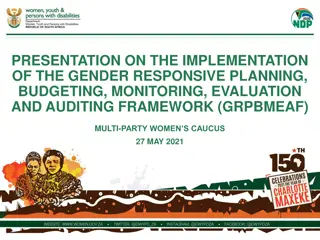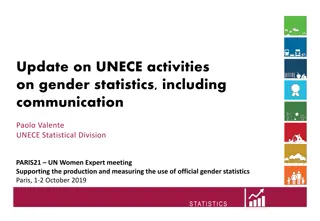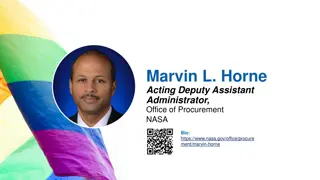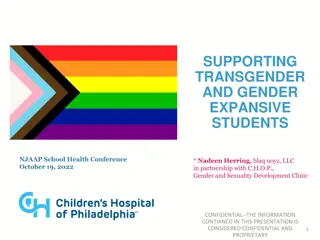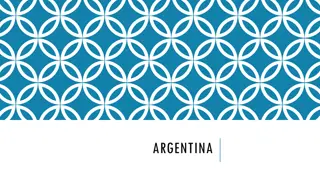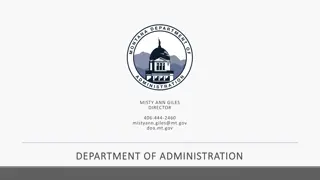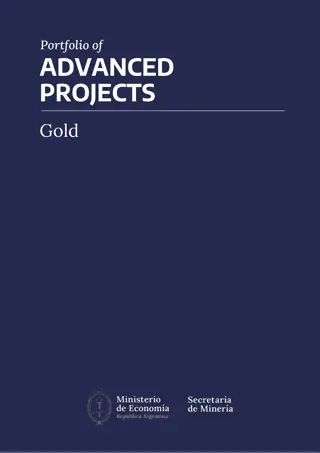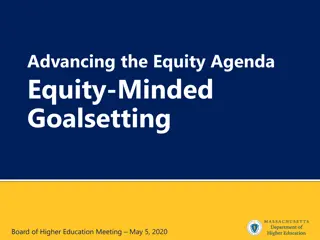Advancing Gender Equity in Scientific Research: A Spotlight on CONICET in Argentina
Explore the efforts of CONICET, the leading agency for science and technology in Argentina, in promoting gender equity in research. Learn about the initiatives, milestones, and statistics showcasing the growing presence of female scientists in Latin America. From the federalization of science to the evolution of female researchers, discover how CONICET is driving positive change towards gender balance in the scientific community.
Download Presentation

Please find below an Image/Link to download the presentation.
The content on the website is provided AS IS for your information and personal use only. It may not be sold, licensed, or shared on other websites without obtaining consent from the author.If you encounter any issues during the download, it is possible that the publisher has removed the file from their server.
You are allowed to download the files provided on this website for personal or commercial use, subject to the condition that they are used lawfully. All files are the property of their respective owners.
The content on the website is provided AS IS for your information and personal use only. It may not be sold, licensed, or shared on other websites without obtaining consent from the author.
E N D
Presentation Transcript
NATIONAL SCIENTIFIC AND TECHNICAL RESEARCH COUNCIL ACTIONS TOWARDS GENDER EQUITY Dr. Ana Franchi President
CONICET is the main agency that fosters science and technology in Argentina. It was created in 1958. The first president of CONICET was Bernardo A. Houssay Nobel Prize winner in Medicine in 1947. Currently, CONICET is an autarchic entity that depends on the Ministry of Science, Technology and Innovation. The Council s mission is to foster and implement scientific and technological activities in the whole territory and all areas of knowledge.
CONICET Areas of knowledge: biomedical, natural & formal sciences, engineering & technology, social sciences & humanities. + 11000 full-time researchers + 2700 technical & research assistants + 1300 administrative & professional staff +12000 scholarships for PhD and post-doctorate students
FEDERALIZATION OF SCIENCE CONICET researchers all across the countries universities and Science and Technology entities CONICET Researchers distribution CONICET Research centers Universities (National/Private) Science and Technology organisms
Female Scientists in Latin America 53% in Argentina Source: UNESCO Institute for Statistics, June 2019.
Evolution of the quantity of both female (in blue) and male (in red) researchers 1985-2020 Female researchers per 100 researchers 1985 -2020
Researchers at CONICET by Gender (2010 2020) WOMEN: FROM 49% in 2010 TO 53% in 2020 YEAR WOMEN WOMEN % MEN MEN % TOTAL 49.68% 2010 3064 3104 50.32% 6168 2011 3364 50.10% 3350 49.90% 6714 2012 3598 50.37% 3545 49.63% 7143 2013 4029 50.99% 3873 49.01% 7902 2014 4410 51.83% 4098 48.17% 8508 2015 4856 52.58% 4380 47.42% 9236 2016 5338 53.19% 4698 46.81% 10036 2017 5477 53.41% 4778 46.59% 10255 2018 5687 53.55% 4932 46.45% 10619 2019 5874 53.81% 5043 46.19% 10917 53.64% 2020 5905 5102 46.35% 11007 Source: Office of Strategic Information in HHRR. Data processed every December Information available on www.conicet.gov.ar
Distribution according to highest category achieved by period of entry 35.0% 32.3% 30.3% 30.1% 30.0% 23.5% 25.0% 21.5% 20.5% 20.0% 16.7% 1985 - 1989 15.0% 10.4% 10.0% 7.7% 7.1% 5.0% 0.0% Asistente Adjunto Independiente Principal Superior Mujer Var n (women on the left Green) (men on the right Violet) 35.0% 32.4% 32.1% 31.9% 28.2% 30.0% 25.0% 22.0% 20.0% 15.9% 1990 1994 15.0% 12.3% 11.4% 8.5% 10.0% 5.2% 5.0% 0.0% Asistente Adjunto Independiente Principal Superior Mujer Var n Categories (from low to high): Assistant, Associate/Adjunt, Independent, Principal and Senior
RESEARCHERS BY CATEGORY AND GENDER FROM JUNIOR TO SENIOR (2020) CATEGORY WOMEN WOMEN % MEN MEN % TOTAL ASSISTANT 1561 994 2555 61.09% 38.90% ASSOCIATE 2427 56.67% 1855 43.32% 4282 INDEPENDENT 1352 49.39% 1385 32.34% 2737 PRINCIPAL 511 41.95% 707 58.04% 1218 25.11% 74.88% SUPERIOR 54 161 215 5905 53.64% 5102 46.35% 11007 TOTAL Source: Office of Strategic Information in HHRR. December 2020
RESEARCHERS DISCIPLINE BY GENDER AREA OF STUDY WOMEN WOMEN % MEN MEN % TOTAL Agrarian, Engineering and Material Sciences 1358 53.21% 1194 46.79% 2552 Biological and Health Sciences 1969 61.28% 1244 38.72% 3213 Social Sciences and Humanities 1406 57.55% 1037 42.45% 2443 Formal and Natural Sciences 991 41.69% 1386 58.31% 2377 150 45.18% 182 54.82% 332 TECHNOLOGY Source: Office of Strategic Information in HHRR. December 2019
DIFFERENCES ACCORDING TO AREAS & DISCIPLINES MORE WOMEN IN MOST AREAS (BIOMEDICAL, ENGINEERING & SOCIAL) AND DISCIPLINES (ANTHROPOLOGY, BIOTECHNOLOGY, PSYCHOLOGY, EDUCATION, MEDICINE) LESS WOMEN IN THE AREA OF NATURAL SCIENCES AND IN SOME DISCIPLINES (PHYSICS, INFORMATICS, ECONOMICS) UNESCO SURVEY REGARDING KIDS PERFORMANCE IN STEM 46% BELIEVE THERE ARE DIFFERENCES BETWEEN BOYS AND GIRLS REGARDING STEM PERFORMANCE (BOYS WOULD HAVE A BETTER DEVELOPMENT)* *UNESCO Regional Chair Women Science and Technology in Latin America - FLACSO Argentina with the Civil Association Chicos.net, and with the support of Disney Latin America.
BACKGROUND LEGAL FRAMEWORK IN ARGENTINA Gender quotas (1991) / parity (2019) in political representation CEDAW & other UN & Inter-american human rights conventions within the Argentine Constitution (1994) Equal (Gay & Lesbian) Marriage (2010) Transgender Identity Law (2012) Law Micaela Mandatory training on gender for every public officer & employee (judiciary, congress, executive, incl. public organisms like CONICET) (2018) Ministry of Women, Gender and Diversity (2019) Abortion Law (2020) Positive discrimination for transgender (quotas) within the public sector (2020)
ONGOING INITIATIVES IN CONICET ACTIONS Beyond MATERNITY LEAVE Female fellows may request maternity leave for 100 calendar days (minimum of 30 days and maximum of 45 days prior the estimated date of delivery) Extension of the current scholarship for an equal to the period of the leave of absence Female researchers are exempted from presenting the annual report in the year in which they had a child Extension on the scholarship applications period due to pregnancy Care and careers: adaptation of maternity and paternity leaves (also: recognition of same-sex couples and homo-parenthood) other care measures
ACTIONS Creation of an Observatory of gender-based violence and violence at the workplace Protocols & guidelines (2019) aiming at creating safe and reliable spaces for affected people to share their situation/their experiences, Creation of spaces of counselling and reception of complaints Pilot experiences in 11 regions & in partnership with universities Creation of instruments and guidelines in response to gender based violence and violence at the work place, an information system (register file) & a website (in progress) Production of information material Seminars and trainings Law Micaela
ACTIONS Inter-institutional articulation Ministry of Science: Creation of a National Program for Gender Equality in Science, Technology and Innovation Ministry of Woman, Gender and Diversity: special recognition of the scientific work against COVID-19 L Or al UNESCO: For Women in Science Award and Special Mentions to female researchers Global Reaserch Council: active participation in gender working groups of different entities like GRC Argentine Presidency: special event in Casa Rosada (Government s Main Building) the Sal n de los Cient ficos (Male Scientists Room) became the Sal n de la Ciencia Argentina (Argentine Science Room) including pictures of Argentinean female scientists
Argentine female scientists: - - - Eugenia Sacerdote de Lustig (Medical Sciences) Irene Bernasconi, Mar a Adela Caria, Elena Mart nez Fontes, Carmen Pujals (first female scientists to lead an expedition to the Antartic) Elisa Bachofen (first female Engineer in Argentina and Latin America) Rebeca Guber (Mathematics and Computational development) Sara Rietti (Femal Public Servant and Director of Magister in Politics and S&T Management of UBA) Elvira L pez (first graduate of Philosophy and Literature) Telma Reca (Psychology) Hetty Bertoldi de Pomar (Geology) - - - - - - Not only symbolically, but we are also taking key steps in the symbolic sphere. said the Minister of Woman, Gender and Diversity, Elizabeth G mez Alcorta Feb 2022
ACTIONS Other ongoing initiatives All-male boards, scientific committees, organizing committees will not be funded or sponsored Gender equity is encouraged in every board and evaluation committee Researchers who have been denounced will not be allowed to direct fellows nor researchers Researchers who have been denounced will not be allowed to apply for Institutes Director positions Recognition of transgender rights: new name & authorship updating records gender transition processes recognized (equivalent to maternity leaves, etc.) Gender-based violence leaves & protection (within and outside the workplace) Kindergarten & protected spaces for breast-feeding
FINAL CONSIDERATION There is still a long way to go before men and women have equal opportunities in their careers, which will not be possible without changes to ensure that the voices, contributions and excellence of women scientists are placed at the top of the political, research and civil society agendas.
Thanks for your attention conicet.gov.ar /CONICETDialoga
